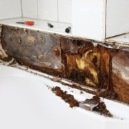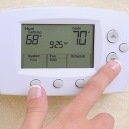Find a pre-screened local mold removal specialist Free Estimate
Find a Mold Specialist Now
Click or Call, Toll-Free 24/7
Symptoms of Mold Poisoning
Mold poisoning is a term sometimes used to refer to a set of medical symptoms of mold exposure. Most types of mold aren’t really poisonous. Some types of mold produce chemical compounds called mycotoxins that are toxic, however, and they can cause serious health problems.
Symptoms
Exposure to mycotoxins produced by mold can cause a wide range of symptoms, including:
- Respiratory infections
- Bleeding in the lungs
- Trouble breathing
- Asthma attacks
- Allergic reactions, including sneezing, runny nose, and itchy, watery eyes
- Itchy rashes and hives
- Headaches or migraines
- Sore throats
- Inflammation and pain in the joints
- Extreme fatigue
- Depression
- Problems with memory or concentration
- Digestive problems
- General feeling of malaise

When to See Your Doctor
See your doctor if you experience any of the above symptoms, especially if these symptoms last for more than a few days and don’t respond to typical over-the-counter treatments or home remedies. If you think you have a respiratory infection, like bronchitis or pneumonia, you need to see your doctor as soon as possible.
Let your doctor know if you think your symptoms might be a result of mold poisoning. It won’t always affect treatment, but sometimes it may. If your doctor thinks mold is causing or contributing to your symptoms, he or she will probably recommend having the mold removed from the home as soon as possible. Treatment may be of limited effectiveness if you continue to be exposed to mold.
When to Go to The Emergency Room
Symptoms of mold exposure are not usually an emergency, but in some instances, you should seek immediate medical treatment. Go directly to the nearest emergency room or call 911 if you:
- Have significant trouble breathing
- Have an asthma attack that doesn’t respond to your usual medication or seems worse than usual
- Have a very high fever
- Cough up blood or experience a bloody, frothy discharge from the nose or mouth
- Are confused or disoriented
Let the emergency room staff know if you think your symptoms might be related to mold exposure.
Keep in mind the fact that most doctors have an answering service and a health care professional is on call 24 hours a day, so if you’re not sure if you need immediate care or can wait to make an appointment at your doctor’s office, call the office any time, day or night, for advice.
Is Mold Causing Your Symptoms?
The symptoms described above can all be caused by exposure to mold, but they can all be caused by other things, too. It can be difficult to determine whether mold poisoning is causing your symptoms or if something else is going on. Let your doctor know if you’ve been exposed to mold in the home, as that information can aid your doctor in making a diagnosis.
If you’re not sure if you’ve been exposed to mold or not, we recommend having a professional come in to test your home for mold. You can pick up mold test kits in many home improvement stores, but they aren’t always accurate, especially if the test isn’t conducted exactly right. A professional knows exactly how to conduct the tests, and where in the home to test for mold, so you’ll get a much more accurate result. A professional can even identify the type of mold growing in your home, which may help your doctor in making a diagnosis and prescribing the most effective treatment for you. Follow the link to find a local professional that can test your home for mold.
Free Home Inspection By A Mold Removal Specialist
Search This Website
Recent Articles
-
See Our 5 Recommended Mold Removal Companies in Covington, KY
Apr 16, 25 12:59 PM
-
See Our 5 Recommended Mold Removal Companies in Wheaton, IL
Jun 20, 24 10:33 AM
-
See Our 5 Recommended Mold Removal Companies in Aberdeen, SD
Oct 08, 21 04:05 PM




